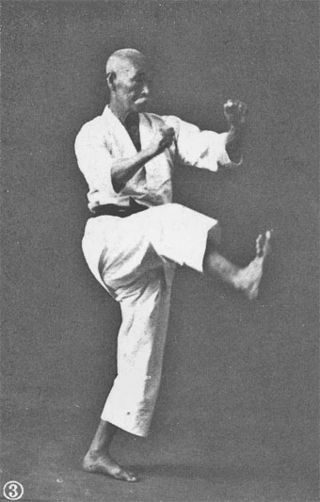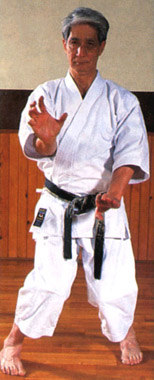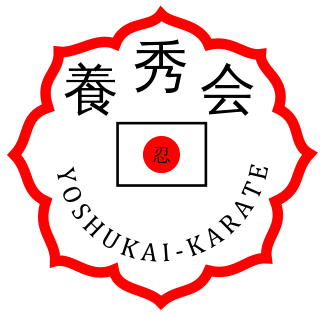Related Research Articles

Karate (空手), also karate-do, is a martial art developed in the Ryukyu Kingdom. It developed from the indigenous Ryukyuan martial arts under the influence of Chinese martial arts. While, Modern Karate is primarily a striking art that uses punches and kicks, traditional karate also employs throwing and joint locking techniques. A karate practitioner is called a karate-ka (空手家).
Kyokushin (極真) is a style of karate originating in Japan. It is a full-contact style of stand-up fighting and is rooted in a philosophy of self-improvement, discipline, and hard training.

The Canadian Olympic Committee is a private nonprofit organization that represents Canada at the International Olympic Committee. It is also a member of the Pan American Sports Organization.
Keigo Abe was a prominent Japanese master of Shotokan karate who founded the Japan Shotokan Karate Association in 1999 and is its Chief Instructor. He held the rank of 9th dan in karate, was a direct student of Masatoshi Nakayama (1913–1987), and was a senior instructor in the Japan Karate Association.

Chitō-ryū (千唐流) is a style of karate founded by Dr. Tsuyoshi Chitose, (1898-1984). The name of the style translates as: chi (千) - 1,000; tō (唐) - China; ryū (流) - style, school, "1,000 year old Chinese style." The character tō (唐) refers to the Tang dynasty of China. The style was officially founded in 1946.

Tsutomu Ohshima[a] is a prominent Japanese master of Shotokan karate who founded the organization Shotokan Karate of America (SKA). He is the Shihan of the SKA, and to this day holds the rank of 5th dan, which was awarded to him by Gichin Funakoshi. Ohshima's branch of the Shotokan world has become known as “Shotokan Ohshima Karate-do.”

Charmaine Crooks, is a Canadian businesswoman, sports executive, and retired sprinter and middle-distance runner.

Hidetaka Nishiyama was a prominent Japanese master of Shotokan karate. He was an internationally recognized instructor, author, and administrator, and helped to establish the Japan Karate Association. Nishiyama was one of the last surviving students of Gichin Funakoshi, founder of Shotokan karate. He was based in the United States of America from 1961 until his death in 2008, and was a pioneer of karate in that country. He had been posthumously awarded the rank of 10th dan in karate.

The Japan Karate Federation (JKF), a.k.a. Japan Karatedo Federation, is a national governing body of the sport karate in Japan. The JKF is officially affiliated with the Japan Olympic Association (JOC), World Karate Federation (WKF), Japan Sports Association (JSA), and Japanese Budō Association (JBA). The styles recognized by the JKF are Gōjū-ryū, Shitō-ryū, Shotokan, and Wadō-ryū. Its headquarter is located in Tokyo, Japan.
David Akutagawa (1937–2008) was a Japanese Canadian martial artist active during the late 20th century.
The Trinidad and Tobago Karate Union (TTKU) is the National Governing Body for the sport of Karate in Trinidad and Tobago. The TTKU is affiliated to the World Karate Federation (WKF) which is the only world karate organization recognised by the International Olympic Committee.
Shotokan Karate of America (SKA) is a non-profit organization in the United States dedicated to teaching traditional karate-do. It was established by Tsutomu Ohshima, a direct student of Gichin Funakoshi, the founder of Shotokan karate. Ohshima is also recognized as the founder of several other Shotokan organizations affiliated with SKA globally. The national headquarters of SKA is located in Los Angeles.
Isao Obata was a pioneering Japanese master of Shotokan karate. He was a senior student of Gichin Funakoshi, who is widely recognized as the founder of modern karate, and was a key figure in the establishment of the Japan Karate Association (JKA) under Funakoshi in 1949. Obata also helped introduce karate to the United States of America through his demonstrations of the art to United States Air Force personnel, and through his students, most notably Tsutomu Ohshima.
Masami Tsuruoka, was a Japanese Canadian karate instructor and practitioner recognized as "The Father of Canadian Karate" by Black Belt Magazine. Although mainly responsible for establishing the Chito-ryu style in Canada, Tsuruoka is also known as founder of his own karate style known as Tsuruoka Ryu.

Yoshukai is a Japanese style of Karate–dō. Karate-do. Karate-do translates as "Way of the Empty Hand." The three kanji that make up the word Yoshukai literally translate as "Training Hall of Continued Improvement." However, the standardized English translation is "Striving for Excellence." Yoshukai Karate has been featured in Black Belt Magazine. Yoshukai karate is a separate Japanese style from Chito-ryu. Kata, kobudo, kumite, and all karate aspects are drawn from the Founder, Mamoru Yamamoto. Yoshukai is a newer derivative Japanese style.
Randall Kleck is an American martial artist and three time world champion. In a martial arts career spanning over 40 years he has been a student, competitor, judge, instructor, and author.
Allegheny Shotokan Karate is a Western Pennsylvania-based martial arts school established in 1969 in Pittsburgh, Pennsylvania. The dojo was founded by Bill Viola Sr., who the Heinz History Center references as a co-creator of the modern sport of mixed martial arts. The school is currently located in Irwin, Pennsylvania, North Huntingdon Township and operates under the name "Viola Karate."

Karate began in the 14th century on the island of Okinawa. Karate as a word first emerged due to Gichin Funakoshi. Karate was introduced to mainland Japan in the 1920s.

The Armenian Shotokan Karate Federation, is the regulating body of Shotokan karate in Armenia, governed by the Armenian Olympic Committee. The headquarters of the federation is located in Yerevan.
References
- ↑ "Shotokan Karate-Do Student Manual" (PDF). National Karate Association of Canada. School of Martial Arts Shotokan Karate-Do. 2008. p. 6. Archived from the original (PDF) on August 21, 2010.
- 1 2 3 "History of Karate Style Blocks & Chart". Canada Seiwa Kai. 2010. Archived from the original on November 27, 2010.
- ↑ Duchesney, Morgan (First Quarter 2006). "Karate Organizations: A Theoretical Approach". National Karate Association of Canada. Originally published in Uchinadi Journal. Retrieved July 21, 2010.
- ↑ "Strategic Planning Retreat" (PDF). Karate Canada. 2009. Retrieved July 21, 2010.
- ↑ "Sport Karate in Canada". Kuma Martial Arts. 2009. Archived from the original on July 18, 2010.
